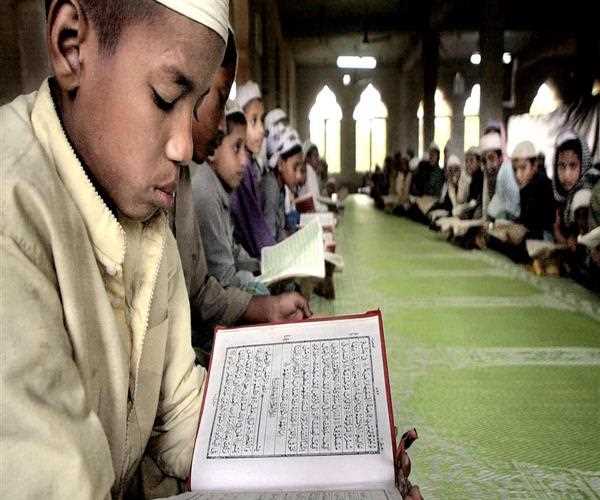
28-Mar-2024 , Updated on 3/29/2024 3:53:10 AM
Allahabad High Court bulldozed the Islamic Madrasa System in UP
It is finally happening although it should have happened long back, the decision of the Allahabad High Court to hold the Uttar Pradesh Board of Madrasa Education Act, 2004 as unconstitutional is an opening for the country. This verdict is certainly going to be taken as a great step towards an alternative modern and secular education system in Uttar Pradesh.
The move is not just for the sake of the some legal frameworks or politics or elections; it is to guarantee that no child, irrespective of their background and religion is left out and has the best education that prepares them for the world of the modern day. It is also about our country being secular and constitutional, it is completely wrong to have a different education system for a specific religion.
Overdue Reform: The Need for The Changes
For a long time, madrasas in Uttar Pradesh have gone beyond the reach of any legal supervision as they have been promoting teachings that at times lead to extreme violence and hate. These unregistered institutes have become a platform for young mind manipulation like jihad, and terrorism and they also plan to promote conflicts such as Hindu vs Muslim fights. Some Madarsas are doing illegal transportation of different things and are working secretly sending information to another country
One of the factors why Muslim kids are engaging in terrorist activities is because they are not educated enough. This is why education can be the right measure to manage terrorism. When a human being has no education, it is not good. It is probably assumed that education takes into consideration all aspects, including religious beliefs, secular, scientific, and moral among others. Thus, the court of Allahabad directing the removal of the Madrasa Act is a tremendous action taken to ensure the attitudes of these institutions and develop a more mature and progressive educational system.
Beyond Religious Boundaries: A Secular Education
Education should overlook all religious boundaries and let students grow separate from or together with the faith. The main thing that should be mastered is information and skills that would make people independent and ready to cope with different situations in the world. Striking down the Madrasa Act, the High Court of Allahabad has confirmed the principle of secularism laid down as one of the basic tenements of the Indian Constitution. It’s about giving each child an opportunity to learn a curriculum that goes beyond not only religious ones but also ones related to science, mathematics, social sciences, and other fields forming a part of the complete development.
Not only that, the Muhammad in Madarsa teaches their students only about the Quran and their religion and other subjects like Science, Mathematics and Social Science are optional. If this keeps happening, in coming years India will step behind in terms of global education as students will have difficulty getting into colleges and higher schools and competing with the world.
Empowering India: Taking part in the World Compression
Today with the fact that the world is increasingly becoming more interdependent, countries rival not only with their economic and military power but also with the quality of their education systems. The education reform in madrasas implemented by Uttar Pradesh will enable this state to take a competitive place in the global arena. A secular education system with a focus on critical thinking, innovation, and scientific research will see graduates who are competent to solve the challenges of the 21st century and help in the growth and development of India.
A Paradigm Shift: Building New Selves
The choice to dismantle the Madrasa Act is not only a judicial verdict but a perception and dimension that explains what national identity is. It’s a denial of the mindset that uses certain beliefs to fill off for personalities. When India adopts the secular education system, the country shows that it adheres to pluralism, tolerance, and inclusivity which are the common values of the citizens. This affirms the powerful message that in the eyes of the law, all citizens are equally created, irrespective of their religious backgrounds.
Looking Ahead: The significance and prospect of tomorrow
What, then, is important in the Allahabad High Court's priority should move towards the institutionalization of the reforms. It is necessary to put an end to the old Madarsa Act with new provisions of the law which stand for the secular and equality values, outlined in the Constitution. This will not only serve as the basis for each child acquiring equal quality education, but as well as open societal transformation doors. It is a milestone to be on the path that hopefully one day will give rise to a `new India` where religion would not have a physical pinhole in our country.
Now that we have made this critical first step we can also expect a systematic uprooting of other laws governing Muslims and other groups based on religion or ethnicity. India is a country, which was formed because of the policies of pluralism and diversity, where the law is the same for all citizens regardless of their origin, religion and ethinicity.
Unity in Diversity: Preservation of Our Cultural Heritage
Similarly, it is important to understand that India’s rich cultural cloth is knitted from a weave of diversity. Whether in the very old Sanatan Dharma idea to the varied array of religions and beliefs we have today, one important thing that binds us is our heritage of pluralism. By destroying the Madrasa Law, we reiterate the values of the “unity in diversity” concept, which has been embedded in our country. It is an expression of how it is important to distinguish ourselves by celebrating our uniqueness and acknowledging our common humanity at the same time.
If we peep through the pages of history we can find that, much before the names of Hindu, Muslim, or Sikh were rolled out, the vast dharma from the space of eternity—Sanatan Dharma—already flourished. The Sanatan Dharma philosophy reflects timeless principles of dharma, duty, and enlightenment that prepare the humankind for that common spiritual Mission. Hinduism, which is built on the solid foundation of this ancient tradition, is the very thick thread that ties together the beliefs and practices of the Hindus.
Therefore these religious clashes, special schools, and other special laws most probably would not have been begun if those things were avoided from the beginning and there is no point in all those things. At last, the Government has begun to shed light on that issue. As we take on the next phase of our education story, let us not forget that the standard for success has nothing to do with how we divide but with our ability to join together.

Student
An MBA in finance imparts and improves management aptitude, inventive ability, critical thinking ability, and so forth. It offers a real-time experience that fabricates a staunch career foundation for students and working professionals. It helps them to thoroughly understand the financial sector.
Comments
Join Our Newsletter
Subscribe to our newsletter to receive emails about new views posts, releases and updates.
Copyright 2010 - 2026 MindStick Software Pvt. Ltd. All Rights Reserved Privacy Policy | Terms & Conditions | Cookie Policy